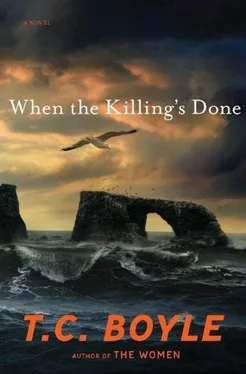He ignored her. He was staring beyond her to where Giancarlo was making his way across the crowded room, people beckoning to him, reaching out to shake his hand and bathe in his smile, congratulating themselves because they were on intimate terms with the owner. And Giancarlo more than fulfilled his role — fifty-two years old, born and raised in Turin, tall, open-faced, wearing a slate-gray Italian silk suit, his hair swept back like a don’s. He was smiling when he came up to the table. “Alma,” he said, repeating her name again, before bending to take her hand and kiss it. “What can I do for you and your gentleman friend?”
“You’re the sommelier?” LaJoy seemed to be glaring at him. “I’d like a bottle of the Brunello di Montalcino Riserva, 1988—the Castello Ruggiero, the one here,” pointing to the bottom of the last page of the leather-bound wine list. He raised an admonitory finger. “But only if you’ve got more than one on hand, because there’s nothing more disappointing than ordering a top-end wine and getting to the bottom of the bottle only to have the waiter try to substitute something else.”
“Yes,” Giancarlo said, in answer to both questions. “This is one of our rarest and finest wines, and we do have at least a few bottles on hand, I’m quite sure.” And then he attempted a witticism, which was lost on LaJoy: “If you should consume them, I would be more than just happy, perhaps even rhapsodic, and I will personally drive back to the house and get you yet another from my own personal cellar.”
Through all this, Alma had held on to her smile, but she’d begun to view LaJoy — Dave — in a new light. He was agitated, she could see that, but why? Was he trying some sort of power play, putting down Fredo and now Giancarlo himself, as if this would impress her? But Giancarlo was gone now to fetch the wine — wine, she saw, glancing at the list she eased from the table — that cost three hundred and twenty-five dollars a bottle, and she tried to let the moment pass. “I’m sure it’ll be good,” she said, forcing a different kind of smile altogether, a smile that was two parts reassurance and one of unease.
All he said was, “It better be. At these prices.”
And then Giancarlo was back, taking on the burden himself, presenting the bottle against a snowy cloth. He held it out for LaJoy’s approval, then uncorked it and discreetly slipped the cork onto the table beside his plate. LaJoy snatched it up, sniffed it with a sour look, and set it back down again. Then there was the ritual of the trial pour and LaJoy’s lifting the glass to his nose, holding it up to the light and swirling the wine to aerate it — it was as dark and viscous as the blood at the bottom of the polystyrene tray steak comes in at the supermarket, the steak she hadn’t seen or consumed since she was a teenager because it was against her principles — and then, finally, tasting it.
She watched his face expectantly. Giancarlo was watching too, solicitous, more proper than proper, waiting for the command to pour the glasses full. But LaJoy’s expression was pained. He took a second sip, rinsed his mouth and spat it back into the glass. “Rotgut,” he pronounced.
Giancarlo said nothing. He stood there erect, the restaurant — his life’s blood, his pride, his being — opening up behind him to the gracious tables of murmuring diners, the paintings spotlighted on the deep ochre walls, the potted palms and lacy ferns.
She didn’t know what to do. Certainly she couldn’t demand to taste it herself — or even request it. LaJoy was the expert here. He was the one paying — this was a date, a dinner date — and she had to defer to him. But he was rude, no doubt about it, unnecessarily so — no, boorish. Absolutely boorish. He didn’t say anything in extenuation, not Excuse me, I’m very sorry, and I know this rarely happens, but please bear with me here or even, It must have turned in the bottle —he merely flicked his wrist as if brushing away an insect and dropped his eyes, once again, to the wine list.
This time he ordered a French wine — the second priciest bottle on the list — and this time it was Fredo who presented the bottle and assisted, in his rigidly decorous way, with the ritual of the uncorking, the examination of the cork, the pouring of the sample taste. And this time, without even glancing at the waiter, LaJoy, his lip curled and his gaze locked on hers, said only, “Vinegar.” And when he did look up, his eyes burning with the kind of fanatical hatred you saw in the eyes of revolutionaries, he pronounced his words very carefully, fighting for restraint, “Bring me the list.”
It was then that she began to gather her things, her purse, her shawl, the glasses she’d raised briefly to her eyes in order to glance across the table and match price to wine on the list LaJoy hadn’t thought to offer her, as if her opinion — the opinion of a sake drinker — counted for nothing, first date or no. She was pushing back the chair even before Giancarlo glided across the room, looking grave, to inform them — to inform her as well as this peevish show-off of a smug insensitive tightly smiling man she unaccountably found herself sitting across from — that he was very sorry, but he just couldn’t keep on opening bottles of wine, his finest wines at that, only to have them sent back.
Shoulders slumped, face burning, she made for the door even before LaJoy — not Dave, just LaJoy, as she would ever after think of him — said, “Well fuck you then. We’ll just go someplace else. Someplace that’s the real deal. You know what I mean? A place”—she pictured him gesturing over the table, the napkin slipped from his waist and trailing behind him as he rose to his feet—“with some class. Where they know what wine is.” She pushed through the door and out into the night, turning right, away from her apartment, taking the opposite direction from which they’d come, moving quickly, finding the shadows, cursing under her breath and praying that he wouldn’t try to catch up with her.
But here he is, on her beach, coming toward her with that same hateful gloating look on his face, and she’s not going to let him spoil her morning — she’ll ignore him, that’s what she’ll do, walk right past him as if he didn’t exist. He’s fifty feet away, thirty, ten, and the dogs, tight lariats of skin, are sniffing at her, poking the long tubes of their overbred snouts into the folds of her jeans. “Nice write-up in today’s paper,” he says, and he’s stalled there, right in front of her, gloating, gloating. “Don’t tell me you didn’t see it? The one about your little celebration yesterday? No? Hey, don’t turn away, I’m talking to you.”
She’s past him now, her heart pounding — article, what article? — focusing on the bluffs ahead, fighting to keep her pace steady because she’s not going to give in, not going to give him the satisfaction of seeing her run or even quicken her pace.
“Hey!” he shouts, whirling round to throw his words at her back. “Hey, Alma Boyd Takesue, Dr. Alma — don’t you want to hear what I have to say? Are you in denial or what? Just look in section B, nice article by Toni Walsh. Hey, nice headline too—‘The Real Pests of Anacapa.’ Catchy, huh?”
A hundred feet separate them. The sand is damp beneath her feet, the waves drawn all the way back and gentle as bathwater. Shorebirds run on ahead. Another dog walker solidifies in the distance. Her morning is ruined, she knows it. All she can think of is to get home and find that article, the nail in the coffin of her efforts to woo the Press Citizen . As she will soon discover, the real pests of Anacapa, in the august Toni Walsh’s estimation, are the members of the Park Service in general and Dr. Takesue in particular, the kind of people who think they can manipulate nature and make a theme park out of the islands. And Sickafoose, Tim Sickafoose, consulting ornithologist, whom you would think should know better, wrapping a gloved hand round an auklet chick for a cheesy photo op.
Читать дальше












